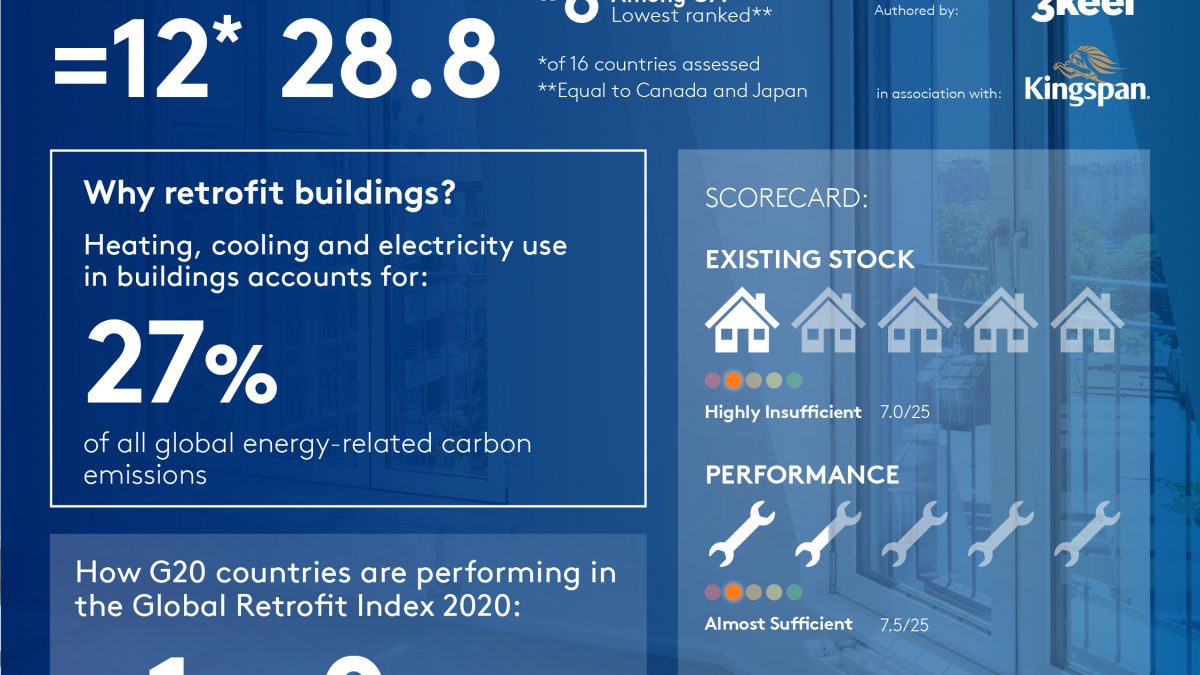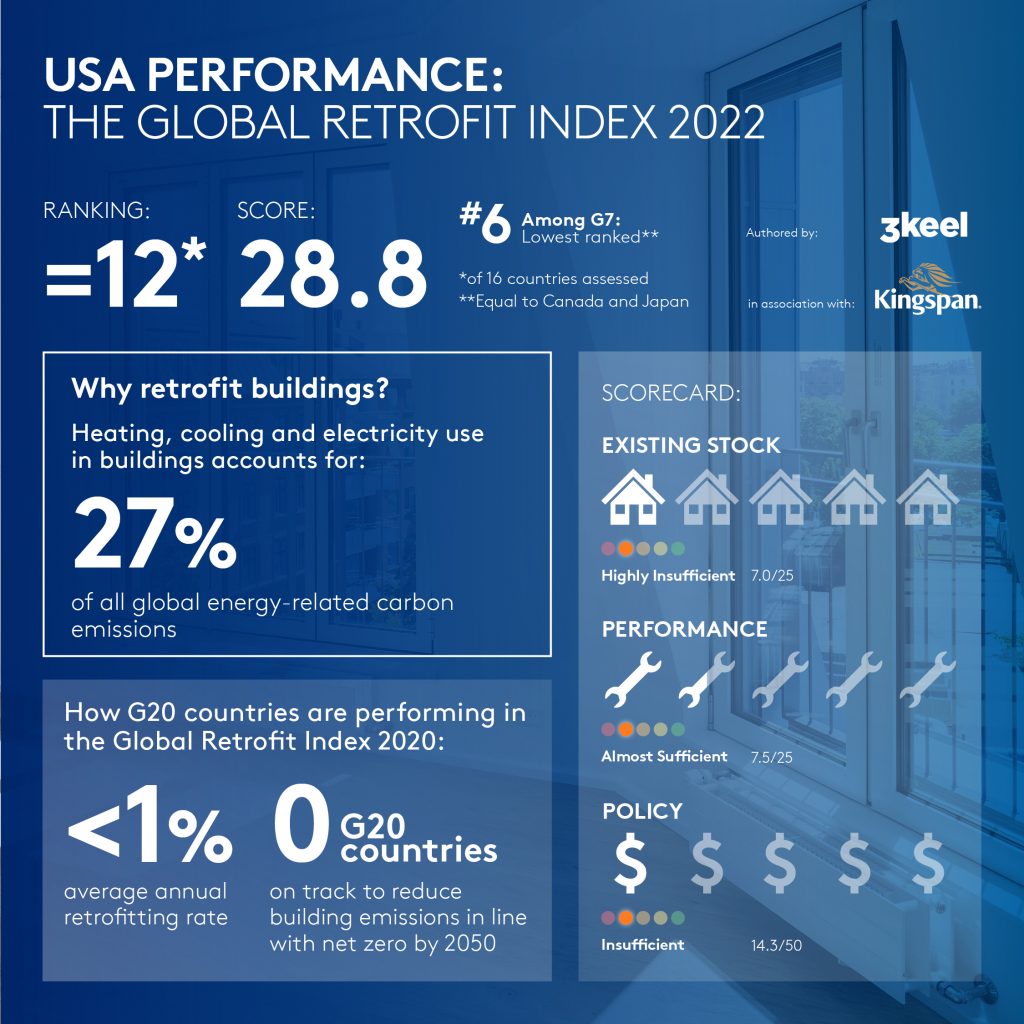
The world’s biggest nations are putting the 2050 net zero carbon targets signed under the Paris Agreement in doubt by moving too slowly to refurbish buildings and cut carbon emissions, warns a major new study conducted by Oxford-based sustainability consultancy 3Keel for global insulation and building envelope solutions manufacturer Kingspan.
U.S. highlights include:
- Inaugural Global Retrofit Index shows urgent need to speed up refurbishment of buildings to meet the 2050 net-zero carbon targets for the built environment signed under the Paris Agreement.
- Report finds that U.S. is failing to reduce emissions at the rate required to achieve net zero by 2050. U.S. has no long-term targets for building emissions reductions, retrofit rates or energy efficiency improvements.
- U.S. trails behind Germany and France at the bottom of the G7 and sits 12th of the G20 in the global retrofit rankings, but even they are not reducing building emissions enough to remain on track for net zero carbon by 2050.
- The Biden Administration has made it clear that action on building energy use is a vital part of achieving the country’s net zero target. Federal funds have been made available to improve building energy efficiency, including through the Inflation Reduction Act 2022.
- Fewer than 1% of buildings in major economies are being given energy efficiency retrofit upgrades each year.
- Governments urged to take action through policy, regulation and investment — average spend on building energy and efficiency is only $30 per person per year — less than 2% of a typical household energy bill.
- By 2030, the building sector must achieve a 45% reduction in energy consumed, a 50% cut in direct emissions and 60% cut in indirect emissions.
The Global Retrofit Index developed by 3Keel assesses the progress G20 countries are making to reduce emissions from existing buildings. In developed economies 80% of the buildings that will be standing in 2050 have already been built, meaning that policymakers have to get to grips with the challenge of making the existing global building stock fit for the future.
Less than 1% of existing buildings in major economies are being given the necessary retrofitting upgrade — through energy efficiency renovations and refurbishments — each year. This is well below the International Energy Agency (IEA) target of 2.5% rate by 2030.
The report evaluates the current need for building retrofits, recent progress, and policy commitments in G20 countries and the G7 economies.
3Keel’s research revealed that among G20 nations, Germany leads the way in its retrofitting performance, followed by France. Nevertheless, even these higher performing countries are not making sufficient progress to reduce emissions in line with global net-zero targets. Among the G7 members, Canada, USA and Japan ranked lowest.
Global Retrofit Index – G20 Countries*
| Ranking | Country | Performance of existing building stock /25 | Retrofit performance /25 | Retrofit policy /50 | Score /100 |
| 1 | Germany | 6.0/25 | 18.8/25 | 36.8/50 | 61.5 |
| 2 | Netherlands* | 8.0/25 | 20.0/25 | 28.3/50 | 56.3 |
| 3 | France | 9.0/25 | 16.3/25 | 30.3/50 | 55.5 |
| 4 | UK | 8.0/25 | 16.3/25 | 28.5/50 | 53.0 |
| 5 | Croatia | 6.0/25 | 20.0/25 | 26.0/50 | 52.0 |
| 6 | Italy | 8.0/25 | 12.5/25 | 31.3/50 | 51.8 |
| 7 | Australia | 11.5/25 | 7.5/25 | 13.5/50 | 32.5 |
| 8 | Mexico | 18.5/25 | 8.8/25 | 5.0/50 | 32.3 |
| =9 | Brazil | 14.0/25 | 11.3/25 | 3.8/50 | 29.0 |
| =9 | Canada | 6.0/25 | 5.0/25 | 18.0/50 | 29.0 |
| =9 | Republic of Korea | 7.0/25 | 5.0/25 | 17.0/50 | 29.0 |
| =12 | Japan | 8.0/25 | 7.5/25 | 13.3/50 | 29.0 |
| =12 | USA | 7.0/25 | 7.5/25 | 14.3/50 | 28.8 |
| 14 | Turkey | 9.0/25 | 0.0/25 | 17.0/50 | 26.0 |
| 15 | Saudi Arabia | 6.5/25 | 12.5/25 | 4.0/50 | 23.0 |
| 16 | China | 9.0/25 | 0.0/25 | 12.5/50 | 21.5 |
| – | South Africa | n/a | n/a | n/a | n/a |
| – | Argentina | n/a | n/a | n/a | n/a |
| – | Indonesia | n/a | n/a | n/a | n/a |
| – | India | n/a | n/a | n/a | n/a |
| – | Russia | n/a | n/a | n/a | n/a |
* Two EU countries were included in the study due to notable retrofits policy: Netherlands and Croatia
** 3Keel was not able to fully assess G20 members Argentina, India, Russia, South Africa, and Indonesia due to a lack of publicly available information on their building sector and/or retrofit policies.
Global Retrofit Index – G7 Countries
| Ranking | Country | Score /100 |
| 1 | Germany | 61.5 |
| 2 | France | 55.5 |
| 3 | UK | 52.8 |
| 4 | Italy | 51.8 |
| 5 | Canada | 29.0 |
| =6 | Japan | 28.8 |
| =6 | USA | 28.8 |
The study concludes that while many G20 countries have achieved some reduction in building-related emissions, they are all failing to do so at the speed and scale required to achieve the 2050 net-zero goals agreed at COP 21 under the Paris Agreements. To get back on track, the sector’s energy intensity must drop five times quicker over the next decade than it did between 2015 and 2020. This will mean achieving a 50% cut in direct emissions and 60% cut in indirect emissions by 2030.
According to the International Energy Agency (IEA), deep energy retrofits of buildings can reduce energy demand linked to heating by two-thirds or more. Retrofitting 20% of buildings in advanced economies over the next five years would reduce CO2 emissions from heating by around one-fifth, says the IEA.
The global energy crisis and supply shortages resulting in soaring energy bills are focusing minds on the benefits of energy efficiency like never before, but the cost-of-living crisis presents challenges to householders and businesses who may not be able to afford the necessary improvements without government support. Major energy savings can be achieved through established technologies such as by improving insulation and installing heat pumps.
We developed the global retrofit index to benchmark the progress made by different countries in reducing emissions from their building stock. Our findings clearly show that we urgently need to significantly increase the retrofit rate globally and ambitious government action will be vital to support the building and construction sector.
To achieve the level of reduction needed, the energy performance of existing building stock will need to be significantly improved and deep energy retrofits needed to achieve the deep cut in emissions we must make. In countries with older building stocks, the need for retrofits will be even greater.
Report author Michael Lord of 3Keel
Globally, buildings are responsible for 37% of energy-related carbon emissions (when compared with other sectors): 27% from operational emissions — the emissions from heating, cooling and electricity, and 10% from embodied emissions — the emissions from construction and maintenance.
Decarbonizing the built environment is a critical issue that must be addressed to help limit the global temperature rise to 1.5⁰C by the end of this century. We need to consume less energy and fewer resources. Rapidly reducing the energy used to heat, cool and power buildings is an essential part of the puzzle and should be one of the planet’s most urgent climate policy goals.
We have the tools, solutions and technologies needed to improve energy performance in buildings. We now need to apply these at scale. We must work together locally and globally to increase the pace of building refurbishments. That means finding innovative models for funding, supporting policy changes, minimizing disruption for the public and ensuring high levels of energy savings over the lifetime of the retrofitted buildings.
This isn’t just the problem of world leaders and Governments. The onus is on all of us across the built environment value chain to engage positively and proactively.
Bianca Wong, global head of Sustainability at Kingspan
The Global Retrofit Index is available to download at 3Keel.

